MercoPress. South Atlantic News Agency
Tag: Argentine Tax Bureau (AFIP)
-
Tuesday, January 28th 2014 - 05:05 UTC
Argentine market cautious reaction to new rules on foreign exchange and dollar savings
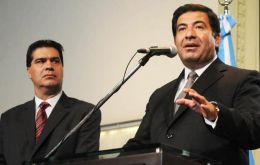
In what promises to be a week of surprises as the Argentine government unfolds measures to contain the price of the US dollar, this Monday the peso held relatively stable after last week's sharp devaluation. While the official rate remained unchanged at 8.01 Pesos for a greenback, in the parallel market it climbed to 12.15 Pesos.
-
Wednesday, January 22nd 2014 - 17:10 UTC
Argentina imposes strict controls on buying on line
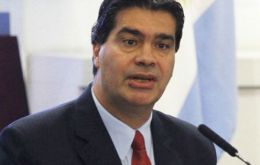
Argentines buying online must now submit a statement to the tax agency, AFIP, before they can receive the goods at the Post Office, as the government seeks to make such purchases more expensive and help curb capital flight.
-
Tuesday, December 3rd 2013 - 21:06 UTC
Argentines will have to spend summer holidays at home; tourist dollar up 35%
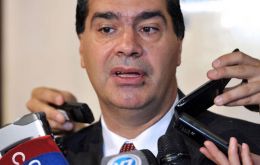
In an attempt to stop the drain of Argentina Central Bank international reserves, the government of President Cristina Fernandez has decided to take the 20% income tax advance to 35% for all credit and debit card purchases made abroad. The move will also involve the purchase of dollars for Argentines travelling abroad with the US currency climbing now to 8.322 pesos.
-
Monday, September 2nd 2013 - 20:02 UTC
Uruguay no longer a magnet for Argentine funds looking for real estate investments
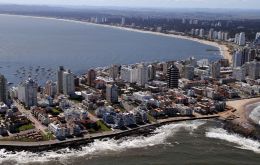
Uruguay has ceased to be the magnet for Argentine funds looking for safe places to save and real estate investments since the Argentine revenue service AFIP, following on the neighbouring countries tax-data exchange agreement, could have access to that information, according to Uruguayan private financial and investment advisors.
-
Friday, August 2nd 2013 - 04:17 UTC
Argentines capable of ‘eluding the Pope and the UN in getting dollars out of their country’

Uruguay president José 'Pepe' Mujica was again ironic in praising Argentines when he stated that the Argentine population “is capable of eluding the Pope and even the United Nations” in their quest to buy US dollars and get them out of the country, in spite of current exchange controls.
-
Saturday, July 20th 2013 - 05:46 UTC
Money exchange controls limit Argentines from travelling to Brazil to greet Pope Francis
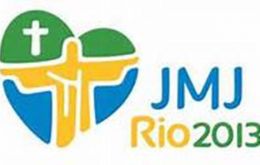
Despite the pope is Argentine and on Monday he will be making his first pastoral trip overseas to Brazil, Argentine government strict currency controls are making it difficult for prospective pilgrims to travel. An estimated 60.000 Argentines are expected to travel to Rio do Janeiro for the grand event.
-
Friday, May 24th 2013 - 07:05 UTC
Argentina raids factory of US investor head of a hedge fund litigating defaulted sovereign bonds
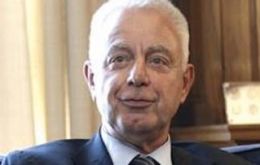
Argentine authorities investigating alleged tax and currency exchange fraud searched this week the factory of a U.S. investor who is among litigants seeking hundreds of millions over Argentina's 2001 default.
-
Saturday, May 18th 2013 - 03:35 UTC
“Blue” dollar in Argentina picks up in last day of trading and reaches 8.95 Pesos

In the last business day of the week in Buenos Aires, the parallel market or ‘blue’ dollar rose to 8.95 Pesos (selling price) after its declining tendency during the week, while the official rate ended steady at exchange houses at 5.245 Pesos (selling price). The gap between the two markets stands at over 70%.
-
Friday, May 17th 2013 - 06:46 UTC
Argentine whitewash bill turning into ugly electoral debate
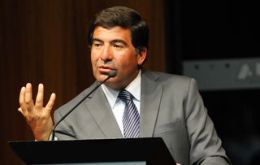
Argentina’s whitewashing bill or more modestly ‘tax amnesty’ has joined the political debate of the coming October mid-term elections. The tax revenue bureau or AFIP confirmed taxpayers’ “legitimate externalization right” “will not be affected” even in the “hypothetical case that the opposition manages to rally a majority parliamentary stance” after October’s legislative elections.
-
Thursday, May 9th 2013 - 04:56 UTC
Argentina: Dollar kept climbing on Wednesday and reached 10.45 Pesos
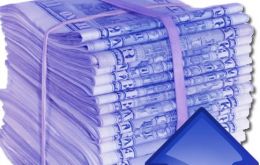
Despite the tax amnesty bill and investment options pledged by the government of President Cristina Fernandez, the dollar kept climbing in Argentina. After breaking the key psychological barrier of 10 Pesos to the dollar on Tuesday, the “blue” dollar which trades on the parallel market climbed again on Wednesday another 37 cents to reach 10.45 Argentine Pesos.
